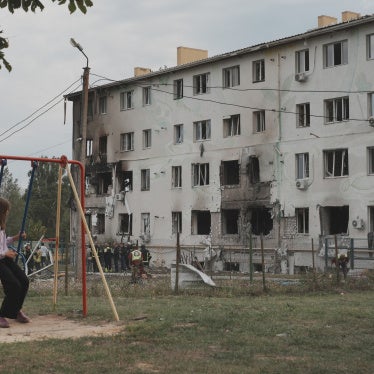Human Rights Watch urged the international community to take immediate steps to stop the violence in Chechnya.
The rights group said the Istanbul summit of the Organization for Security and Cooperation in Europe (OSCE) should refuse to sign new security agreements unless Russia demonstrates its commitment to abide by international law.
"The international community should not repeat the mistakes it made during the last war in Chechnya," explained Holly Cartner, executive director of Human Rights Watch's Europe & Central Asia Division. "The OSCE needs to make it clear that civilian suffering in Chechnya is already too great."
Human Rights Watch is urging the OSCE to press the Russian government for access to the conflict zone to monitor and alleviate conditions for civilians, and to simplify border procedures. It should also persuade the Russian government to agree to well-publicized temporary cease-fires to allow civilians to flee unharmed. Finally, it should ensure that any new OSCE assistance group to Chechnya have unfettered access to the conflict zone.
Should the Russian government fail to demonstrate its commitment to OSCE standards, OSCE member states should be prepared to consider refusing to conclude the Security Charter at the summit. This charter will be one of the major points of negotiation among the 55 heads of state.
Since Russia began bombing and shelling Chechnya in September, an estimated 300,000 people have fled their homes. Countless civilians have been killed or maimed. About 200,000 internally displaced persons crowd tiny Ingushetia, straining its already fledgling infrastructure. Cold temperatures put many of them in life-threatening situations.
As the bombing and shelling drags on, tens of thousands of civilians are desperate to find their way to safety. Human Rights Watch researchers who interviewed the displaced in Ingushetia have found that persistent aerial or other missile attacks have prevented people from fleeing Chechnya, causing them to huddle in basements or venture to other villages that were not under attack. This has had disastrous consequences for civilians injured by the attacks but could not seek timely medical assistance.
This suffering was compounded by the ten-day closure of the Chechen-Ingush border, the main exit route for civilians out of Chechnya. The new border procedures are cumbersome and still spell lengthy delays. Russian authorities have refused to allow international humanitarian assistance through the border to reach these people. Indeed, they have refused all access to Chechnya, creating an information blackout on the needs of civilians left behind. Just last week, Russian forces refused to allow an OSCE mission in the region access to Chechen side of the border.







